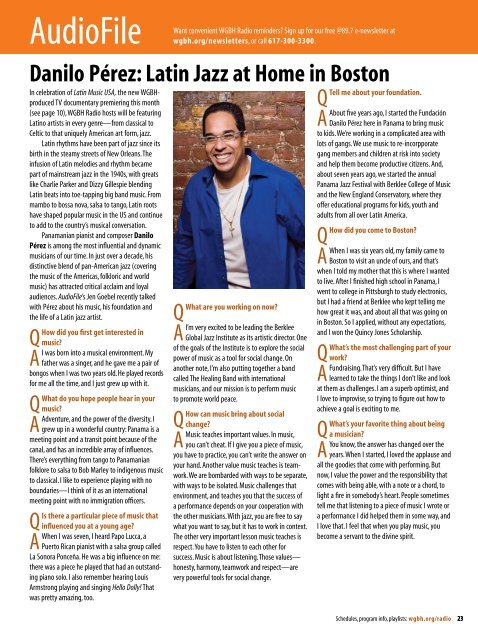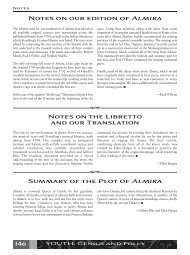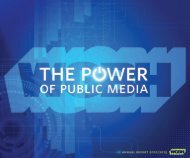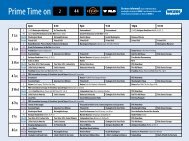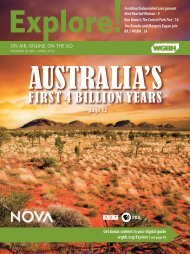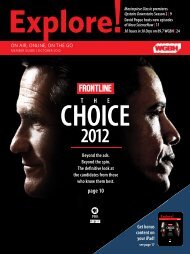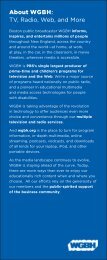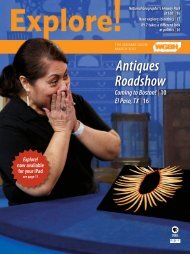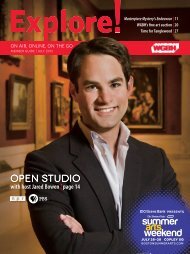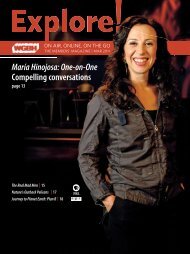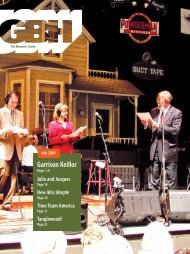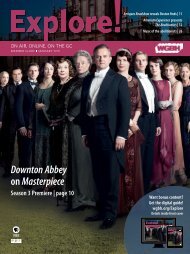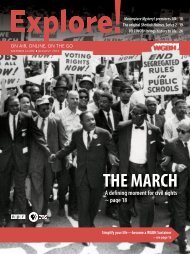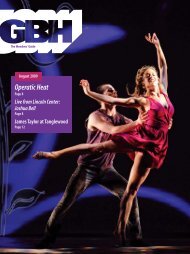Latin Music USA: It's Gonna Move You - WGBH
Latin Music USA: It's Gonna Move You - WGBH
Latin Music USA: It's Gonna Move You - WGBH
You also want an ePaper? Increase the reach of your titles
YUMPU automatically turns print PDFs into web optimized ePapers that Google loves.
AudioFile<br />
In celebration of <strong>Latin</strong> <strong>Music</strong> <strong>USA</strong>, the new <strong>WGBH</strong>produced<br />
TV documentary premiering this month<br />
(see page 10), <strong>WGBH</strong> Radio hosts will be featuring<br />
<strong>Latin</strong>o artists in every genre—from classical to<br />
Celtic to that uniquely American art form, jazz.<br />
<strong>Latin</strong> rhythms have been part of jazz since its<br />
birth in the steamy streets of New Orleans. The<br />
infusion of <strong>Latin</strong> melodies and rhythm became<br />
part of mainstream jazz in the 1940s, with greats<br />
like Charlie Parker and Dizzy Gillespie blending<br />
<strong>Latin</strong> beats into toe-tapping big band music. From<br />
mambo to bossa nova, salsa to tango, <strong>Latin</strong> roots<br />
have shaped popular music in the US and continue<br />
to add to the country’s musical conversation.<br />
Panamanian pianist and composer Danilo<br />
Pérez is among the most influential and dynamic<br />
musicians of our time. In just over a decade, his<br />
distinctive blend of pan-American jazz (covering<br />
the music of the Americas, folkloric and world<br />
music) has attracted critical acclaim and loyal<br />
audiences. AudioFile’s Jen Goebel recently talked<br />
with Pérez about his music, his foundation and<br />
the life of a <strong>Latin</strong> jazz artist.<br />
QHow did you first get interested in<br />
music?<br />
was born into a musical environment. My<br />
A<br />
I<br />
father was a singer, and he gave me a pair of<br />
bongos when I was two years old. He played records<br />
for me all the time, and I just grew up with it.<br />
QWhat do you hope people hear in your<br />
music?<br />
A<br />
Adventure, and the power of the diversity. I<br />
grew up in a wonderful country: Panama is a<br />
meeting point and a transit point because of the<br />
canal, and has an incredible array of influences.<br />
There’s everything from tango to Panamanian<br />
folklore to salsa to Bob Marley to indigenous music<br />
to classical. I like to experience playing with no<br />
boundaries—I think of it as an international<br />
meeting point with no immigration officers.<br />
QIs there a particular piece of music that<br />
influenced you at a young age?<br />
A<br />
When I was seven, I heard Papo Lucca, a<br />
Puerto Rican pianist with a salsa group called<br />
La Sonora Ponceña. He was a big influence on me:<br />
there was a piece he played that had an outstanding<br />
piano solo. I also remember hearing Louis<br />
Armstrong playing and singing Hello Dolly! That<br />
was pretty amazing, too.<br />
Want convenient <strong>WGBH</strong> Radio reminders? Sign up for our free @89.7 e-newsletter at<br />
wgbh.org/newsletters, or call 617-300-3300.<br />
Danilo Pérez: <strong>Latin</strong> Jazz at Home in Boston<br />
QWhat are you working on now?<br />
A<br />
I’m very excited to be leading the Berklee<br />
Global Jazz Institute as its artistic director. One<br />
of the goals of the Institute is to explore the social<br />
power of music as a tool for social change. On<br />
another note, I’m also putting together a band<br />
called The Healing Band with international<br />
musicians, and our mission is to perform music<br />
to promote world peace.<br />
QHow can music bring about social<br />
change?<br />
A<br />
<strong>Music</strong> teaches important values. In music,<br />
you can’t cheat. If I give you a piece of music,<br />
you have to practice, you can’t write the answer on<br />
your hand. Another value music teaches is teamwork.<br />
We are bombarded with ways to be separate,<br />
with ways to be isolated. <strong>Music</strong> challenges that<br />
environment, and teaches you that the success of<br />
a performance depends on your cooperation with<br />
the other musicians. With jazz, you are free to say<br />
what you want to say, but it has to work in context.<br />
The other very important lesson music teaches is<br />
respect. <strong>You</strong> have to listen to each other for<br />
success. <strong>Music</strong> is about listening. Those values—<br />
honesty, harmony, teamwork and respect—are<br />
very powerful tools for social change.<br />
QTell me about your foundation.<br />
A<br />
About five years ago, I started the Fundación<br />
Danilo Pérez here in Panama to bring music<br />
to kids. We’re working in a complicated area with<br />
lots of gangs. We use music to re-incorpporate<br />
gang members and children at risk into society<br />
and help them become productive citizens. And,<br />
about seven years ago, we started the annual<br />
Panama Jazz Festival with Berklee College of <strong>Music</strong><br />
and the New England Conservatory, where they<br />
offer educational programs for kids, youth and<br />
adults from all over <strong>Latin</strong> America.<br />
QHow did you come to Boston?<br />
I was six years old, my family came to<br />
A<br />
When<br />
Boston to visit an uncle of ours, and that’s<br />
when I told my mother that this is where I wanted<br />
to live. After I finished high school in Panama, I<br />
went to college in Pittsburgh to study electronics,<br />
but I had a friend at Berklee who kept telling me<br />
how great it was, and about all that was going on<br />
in Boston. So I applied, without any expectations,<br />
and I won the Quincy Jones Scholarship.<br />
QWhat’s the most challenging part of your<br />
work?<br />
A<br />
Fundraising. That’s very difficult. But I have<br />
learned to take the things I don’t like and look<br />
at them as challenges. I am a superb optimist, and<br />
I love to improvise, so trying to figure out how to<br />
achieve a goal is exciting to me.<br />
QWhat’s your favorite thing about being<br />
a musician?<br />
A<br />
<strong>You</strong> know, the answer has changed over the<br />
years. When I started, I loved the applause and<br />
all the goodies that come with performing. But<br />
now, I value the power and the responsibility that<br />
comes with being able, with a note or a chord, to<br />
light a fire in somebody’s heart. People sometimes<br />
tell me that listening to a piece of music I wrote or<br />
a performance I did helped them in some way, and<br />
I love that. I feel that when you play music, you<br />
become a servant to the divine spirit.<br />
Schedules, program info, playlists: wgbh.org/radio<br />
23


